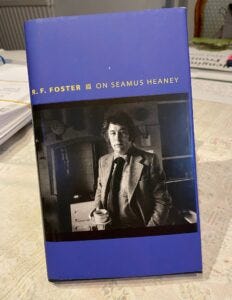Wednesday 21 September, 2022
Quote of the Day
”In this country, it is rare for anyone, let alone a publisher, to take writers seriously.”
Anthony Powell in the Daily Telegraph, 1979
Despite that, Powell managed to sell quite a lot of books. I’ve never fully understood his charm, but perhaps that’s because I was not brought up as an English public schoolboy.
Musical alternative to the morning’s radio news
Four reels: Father Kelly’s; Reconciliation; Mountain Road; MacArthur Road
A hyper-energetic performance at Glucksman Ireland House at New York University. Caitlin Warbelow, Patrick Mangan, and Troy MacGillivray on fiddles with Johnny Cuomo and Jake Charron on guitars.
Long Read of the Day
What Makes Brain Fog So Unforgiving?
I’ve been thinking for two years that so-called ‘Long Covid’ is one of the most worrying — and under-discussed — consequences of the pandemic. Particularly terrifying is the “brain fog” which afflicts many sufferers. This startling essay by Ed Yong is the best thing I’ve read about it to date.
Here’s how it opens…
On March 25, 2020, Hannah Davis was texting with two friends when she realized that she couldn’t understand one of their messages. In hindsight, that was the first sign that she had COVID-19. It was also her first experience with the phenomenon known as “brain fog,” and the moment when her old life contracted into her current one. She once worked in artificial intelligence and analyzed complex systems without hesitation, but now “runs into a mental wall” when faced with tasks as simple as filling out forms. Her memory, once vivid, feels frayed and fleeting. Former mundanities—buying food, making meals, cleaning up—can be agonizingly difficult. Her inner world—what she calls “the extras of thinking, like daydreaming, making plans, imagining”—is gone. The fog “is so encompassing,” she told me, “it affects every area of my life.” For more than 900 days, while other long-COVID symptoms have waxed and waned, her brain fog has never really lifted…
Worth your time.
Books, etc.
Roy Foster on Seamus Heaney
Roy Foster is an eminent Irish historian — and an accomplished biographer (his two-volume biography of W.B. Yeats is terrific); and Seamus Heaney was a great Irish poet and a Nobel laureate.
This book is a sensitive exploration of Heaney’s poetic journey, written by a scholar who both understands the cultural context in which Heaney evolved and loves his work. “I remember”, he writes in the Preface,
”where I was sitting when I read ’North’ in 1975 and felt that authentic sensation of the hairs standing up on my head. Nearly twenty years later, I read ‘At The Well-head’ in the New Yorker, tore it out, and pinned it to the noticeboard in my Oxford study; slightly yellowed by enduringly magical, it was still there when I moved out after another twenty-odd years. And reading ‘Album’ in his last collection, the attempts to embrace a lost father resonated to profoundly that my eyes filled with tears.”
It’s a truly wonderful book. I have a friend who also loves Heaney’s poetry, and had the great idea of reading it alongside the poems themselves. That’s really what it deserves.



